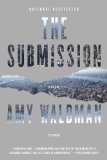Summary | Excerpt | Reading Guide | Reviews | Beyond the Book | Readalikes | Genres & Themes | Author Bio

A Novel
by Amy Waldman
"Gardens are fetishes of the European bourgeoisie," Ariana said, pointing to the dining-room walls, which were papered with a panorama of lush trees through which tiny, formally dressed men and women strolled. Ariana herself was, as usual, dressed entirely in a shade of gruel that she had patented in homage to and ridicule of Yves Klein's brilliant blue. The mockery of pretension, Claire decided, could also be pretentious.
"Aristocratic fetishes," the jury's lone historian corrected. "The bourgeoisie aping the aristocracy."
"It's French, the wallpaper," the mayor's aide, his woman on the jury, piped up.
"My point being," Ariana went on, "that gardens aren't our vernacular. We have parks. Formal gardens aren't our lineage."
"Experiences matter more than lineages," Claire said.
"No, lineages are experiences. We're coded to have certain emotions in certain kinds of places."
"Graveyards," Claire said, an old tenacity rising within her. "Why are they often the loveliest places in cities? There's a poem - George Herbert - with the lines: 'Who would have thought my shrivel'd heart / Could have recover'd greennesse?'" A college friend had written the scrap of poetry in a condolence card. "The Garden," she continued, "will be a place where we - where the widows, their children, anyone - can stumble on joy. My husband..." she said, and everyone leaned in to listen. She changed her mind and stopped speaking, but the words hung in the air like a trail of smoke.
Which Ariana blew away. "I'm sorry, but a memorial isn't a graveyard. It's a national symbol, an historic signifier, a way to make sure anyone who visits - no matter how attenuated their link in time or geography to the attack - understands how it felt, what it meant. The Void is visceral, angry, dark, raw, because there was no joy on that day. You can't tell if that slab is rising or falling, which is honest - it speaks exactly to this moment in history. It's created destruction, which robs the real destruction of its power, dialectically speaking. The Garden speaks to a longing we have for healing. It's a very natural impulse, but maybe not our most sophisticated one."
"You have something against healing?" Claire asked.
"We disagree on the best way to bring it about," Ariana answered. "I think you have to confront the pain, face it, even wallow in it, before you can move on."
"I'll take that under consideration," Claire retorted. Her hand clamped over her wineglass before the waiter could fill it.
Paul could barely track who was saying what. His jurors had devoured the comfort food he had requested - fried chicken, mashed potatoes, brussels sprouts with bacon - but the comfort was scant. He prided himself on getting along with formidable women - was, after all, married to one - but Claire Burwell and Ariana Montagu together strained him, their opposing sureties clashing like electric fields, the room crackling with their animus. In her critique of the Garden's beauty, of beauty itself, Paul sensed Ariana implying something about Claire.
His mind wandered to the coming days, weeks, months. They would announce the winning design. Then he and Edith would visit the Zabar's at their home in Menerbes, a respite for Paul between the months of deliberation and the fund-raising for the memorial that would begin on his return. It would be a major challenge, with the construction of each of the two finalists estimated at $100 million, minimum, but Paul enjoyed parting his friends from serious money. Countless ordinary Americans were sure to open their wallets, too.
Then this chairmanship would lead to others, or so Edith assured him. Unlike many of her friends, his wife did not collect Chanel suits or Harry Winston baubles, although she had quantities of both. Her eye was for prestigious positions, and so she imagined Paul as chairman of the public library, where he already sat on the board. It had more money than the Met, and Edith had pronounced Paul "literary," although Paul himself wasn't sure he'd read a novel since The Bonfire of the Vanities.
Excerpted from The Submission by Amy Waldman. Copyright © 2011 by Amy Waldman. Excerpted by permission of Farrar, Straus & Giroux. All rights reserved. No part of this excerpt may be reproduced or reprinted without permission in writing from the publisher.
Your guide toexceptional books
BookBrowse seeks out and recommends the best in contemporary fiction and nonfiction—books that not only engage and entertain but also deepen our understanding of ourselves and the world around us.